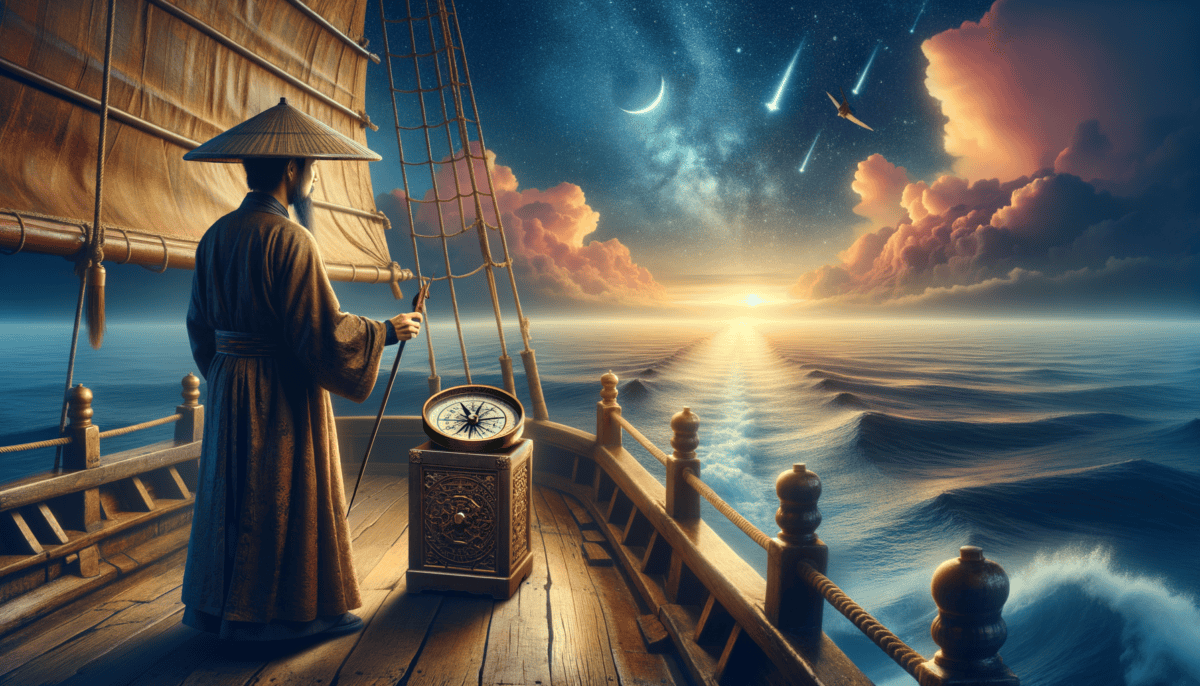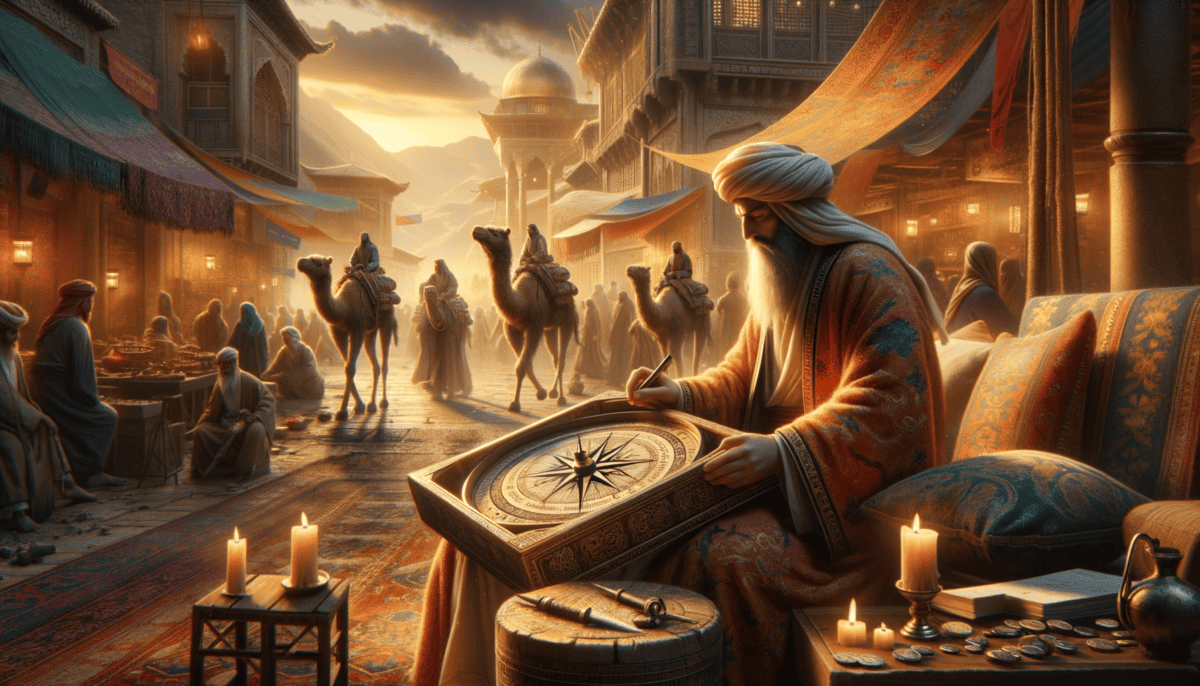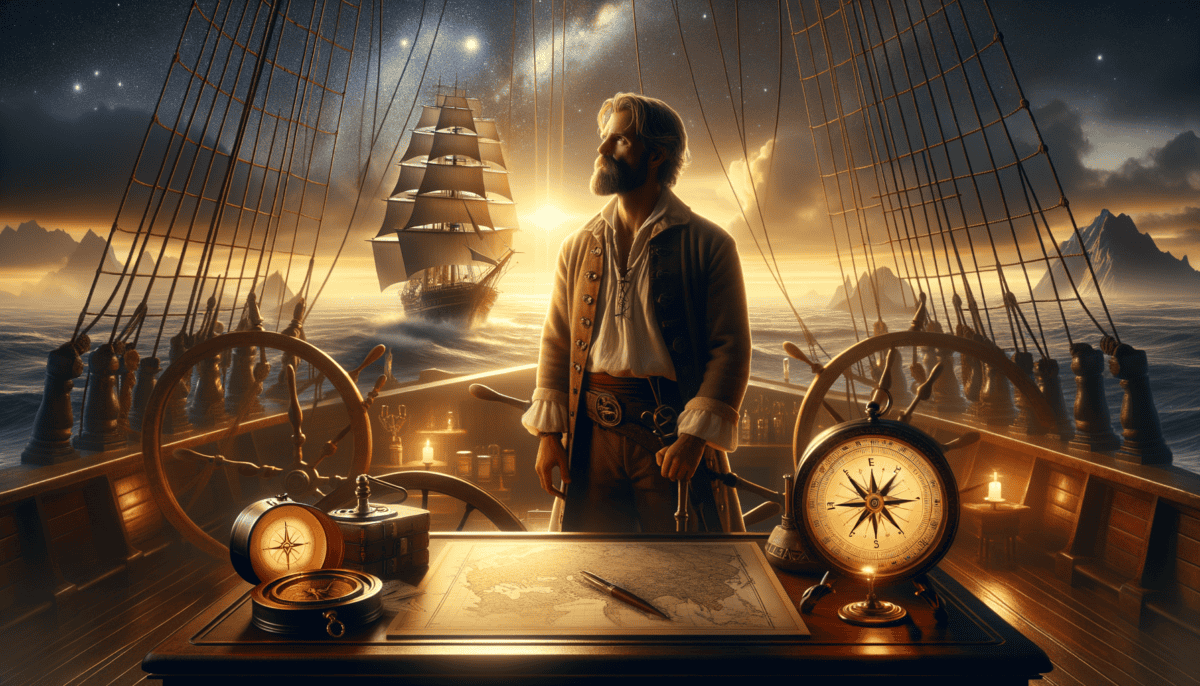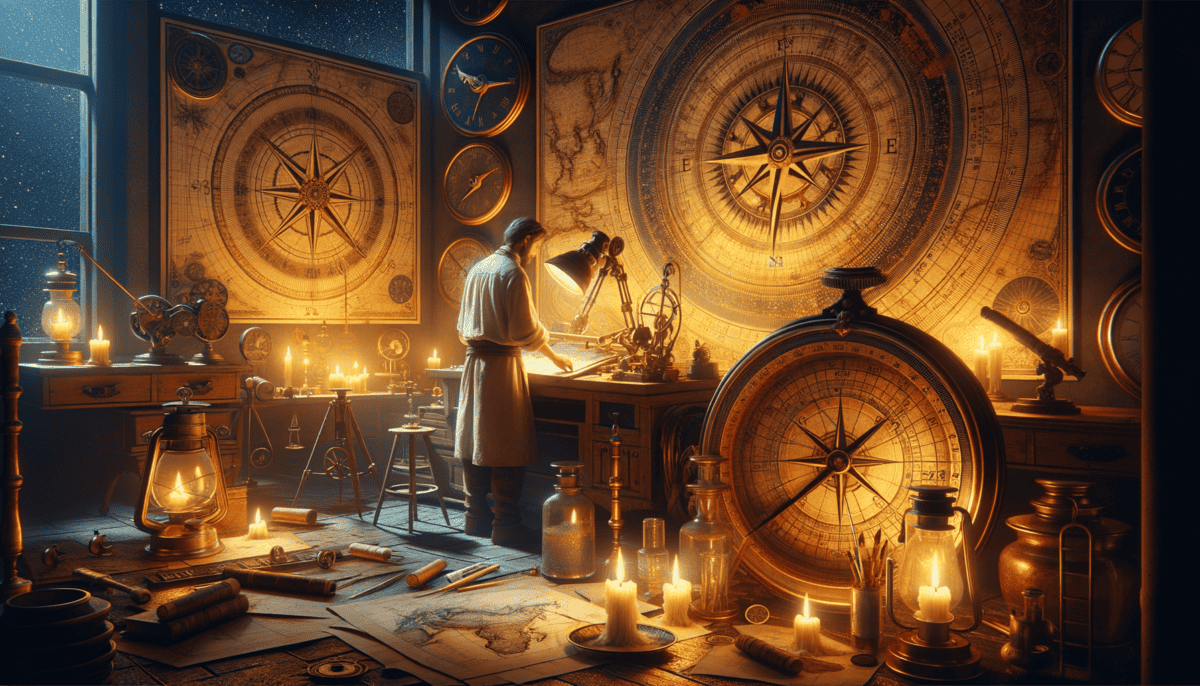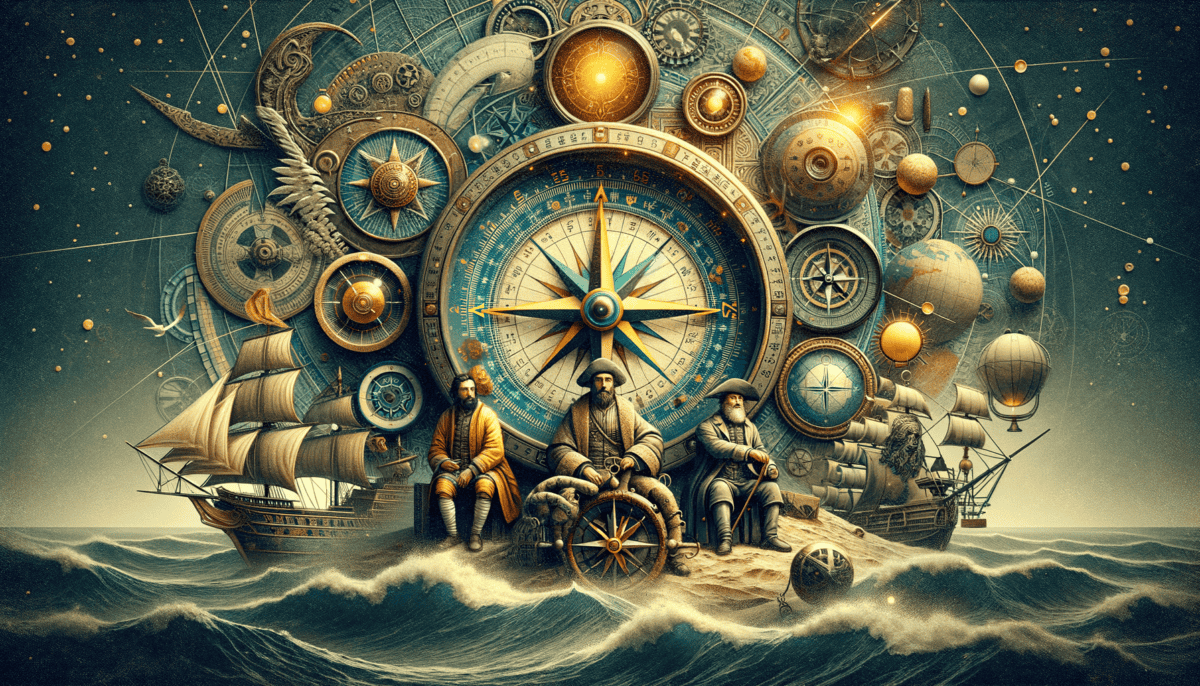The Magic of Magnetism
Long ago in ancient China, a young boy named Li Wei lived with his grandfather in a small village near the mountains. His grandfather was a wise scholar who loved to study special rocks called lodestones.
"Come here, Li Wei," Grandfather called one sunny morning. "I want to show you something magical!"
Li Wei ran to his grandfather's study, where a collection of dark stones lay scattered on a wooden table. His eyes grew wide with wonder as his grandfather picked up one of the stones.
A Special Discovery
"Watch this," Grandfather said with a twinkle in his eye. He placed a small piece of iron near the lodestone. Li Wei gasped as the iron jumped toward the stone all by itself!
"How did it do that?" Li Wei asked, jumping up and down with excitement.
"These stones have a special power," Grandfather explained. "The Han Dynasty emperor calls it the 'loving stone' because it attracts iron like love attracts people to each other."
The Magic Begins
Every day, Li Wei helped his grandfather study the magical stones. They discovered that when they hung a lodestone from a string, it always pointed in the same direction!
"This stone always points south," Grandfather said thoughtfully. "It could help people find their way when they travel."
In those days, people used the stones for special ceremonies. They thought the stones had powers from the gods. But Li Wei and his grandfather saw something more – they saw a tool that could change the world.
A New Purpose
One day, a merchant visited their village. He was lost and couldn't find his way home. Li Wei had an idea!
"Grandfather, can we help him with our special stone?" he asked excitedly.
Grandfather smiled and nodded. They showed the merchant how the hanging stone always pointed south. The merchant's eyes lit up with amazement.
"This is incredible!" he exclaimed. "With this stone, I'll never lose my way again!"
Spreading the Word
News about the magical direction-finding stone spread quickly. More travelers came to learn about it. Some began carrying small lodestones with them on their journeys.
Li Wei watched proudly as his grandfather taught others about the stones. "Remember," Grandfather would say, "these stones are not just magic – they are tools to help us understand our world better."
At night, Li Wei would look at the stars and think about all the ways their discovery could help people. He didn't know it then, but this was just the beginning of an amazing journey – the birth of the compass that would one day help people explore the whole world!
Li Wei fell asleep dreaming of sailors using magical stones to guide their ships across vast oceans, and traders finding new paths through distant lands. Little did he know how right his dreams would turn out to be.
From Stone to Sea: A New Chapter Begins
Many years after Li Wei’s discovery, a brave sailor named Chang Ming stood at the busy docks of ancient China. He held a special bowl filled with water, watching a tiny floating needle point the way south.
A Clever New Idea
“Look here!” Chang Ming called to his fellow sailors. “We don’t need to hang the lodestone anymore. This floating needle works even better!”
The sailors gathered around, amazed at what they saw. The magnetic needle floated freely in the water, always pointing south. This was different from the old hanging stones.
Testing at Sea
Chang Ming took his water compass on his next sea journey. The waves were big, and dark clouds covered the stars. But the floating needle kept pointing south!
“This is wonderful!” he shouted over the wind. “Now we can sail even when we can’t see the stars!”
Other sailors started using water compasses too. They could travel farther than ever before, finding new places to trade.
Making It Better
Soon, clever inventors made the compass even better. They added:
• A special dry case to keep the needle from getting wet
• Markings to show all directions
• A protective cover to keep the wind away
• Pretty decorations to make it look nice
The water bowl became a beautiful wooden case with a glass top. Now sailors could use it in any weather! ⛵
News Spreads Fast
“Have you heard about the new sailing tool?” merchants would ask at every port.
“Yes! It helps ships find their way even in storms!” others would answer.
The compass helped Chinese ships sail to far-away places. They traded silk, tea, and special dishes with people from other lands.
More Than Just Tools
Chang Ming taught young sailors how to use the compass. “This is more than just a tool,” he would say. “It’s like having a friend who always knows the way home.”
Artists began painting pictures of compasses on maps. Writers wrote poems about them. The compass became very important in Chinese life.
One evening, as Chang Ming watched the sunset from his ship, he smiled. He thought about how far they had come from the old hanging stones. Now they had a tool that could guide ships across the biggest oceans.
The stars began to twinkle above as his ship sailed smoothly through the waves. More adventures waited ahead, and now they had the perfect tool to find them! ⭐
New Lands, New Friends
The warm desert wind blew across Ahmad’s face as he stood in the busy marketplace of Baghdad. In his hands, he held something special – a mysterious box with a floating needle that always pointed south.
A Strange New Tool
“What is this magical device?” asked curious traders, gathering around Ahmad.
“It’s called a compass,” Ahmad explained with a bright smile. “I got it from Chinese merchants who came through the Silk Road. It helps find your way anywhere!”
Sharing the Secret
Ahmad traveled with caravans across the desert, teaching others about the compass. “Watch this,” he would say, placing the compass on a flat surface. “The needle always shows us where south is!”
People were amazed. Before the compass, travelers used the stars to find their way. But stars couldn’t help during the day or on cloudy nights.
“This will change everything!” exclaimed a merchant named Khalil. “We can travel safer now!”
The Compass Goes to Europe
Arab sailors began using compasses on their ships. They sailed to new places and met new people. Soon, European traders saw this amazing tool.
“What is that?” asked Marco, an Italian sailor, pointing at the compass.
“It’s our guide through the seas,” replied Ahmad. “Would you like to learn how it works?”
Making New Friends
As Ahmad taught others about the compass, he made friends everywhere he went. People from different lands came together to learn and share:
• Arab sailors shared their sea stories
• European traders brought new ideas
• Persian scholars wrote about the compass
• Indian merchants added their wisdom
The compass wasn’t just helping people find their way – it was bringing people together!
A Growing World
“See how this little needle connects us all?” Ahmad would say to his new friends. “It doesn’t matter what language we speak or where we’re from. The compass speaks to everyone!”
More and more ships started using compasses. They could sail further than ever before. Towns by the sea grew bigger as more traders came to visit.
Ahmad watched happily as his busy port filled with ships from many lands. The sound of different languages mixed with the salty sea air. Thanks to the compass, the world was becoming a smaller, friendlier place. ⛵
As the sun set over the harbor, colorful sails dotted the horizon. Ahmad smiled, knowing that somewhere out there, more adventures waited. And now, with the compass to guide them, anyone could find their way to new friendships and exciting discoveries!
Adventures on the High Seas
Captain Isabella stood proudly at her ship’s wheel, her trusty compass gleaming in the morning sun. The year was 1492, and she was helping the famous explorer Christopher Columbus find a new way to India.
A Brave Journey Begins
“Look at the compass needle,” Isabella said to her young cabin boy, Tommy. “It always points north, showing us the way!”
Tommy’s eyes grew wide. “But Captain, how can we be sure where we’re going? The ocean is so big!”
Isabella smiled and ruffled his hair. “That’s why this compass is so special. It helps us stay on course, even when we can’t see land.”
Making Big Discoveries
The compass helped brave sailors like Vasco da Gama too. He used it to find a path all the way to India! Now ships could sail across big oceans without fear.
“Captain,” called the lookout one morning, “I see something ahead!”
Everyone rushed to the ship’s rail. There, on the horizon, was land no European had ever seen before!
Drawing New Maps
Thanks to the compass, sailors could now:
• Draw better maps
• Find new lands
• Make safer journeys
• Remember how to get back home
“Every journey teaches us something new,” Isabella told her crew. She carefully marked their discovery on her map. Now other sailors could find this place too!
Friendly Meetings
When they reached new lands, the sailors met people who lived there. Though they spoke different languages, they found ways to be friendly.
“Look,” Isabella said, showing her compass to a local chief. “This helps us find our way across the big water.”
The chief smiled and showed them his people’s ways of navigation. Everyone learned from each other!
A Bigger World
As more ships sailed further, people learned amazing things:
“The world is so much bigger than we thought!” Tommy exclaimed one evening.
“Yes,” agreed Isabella, “and there’s still so much more to discover!”
Every new journey brought exciting surprises. Sailors found new foods, met new friends, and learned about different ways of life. The compass made it all possible!
As the sun set over the ocean waves, Isabella watched her crew share stories about their adventures. The little magnetic needle had led them to wonderful discoveries, and there were still more adventures waiting ahead!
Magnetic Mysteries
Professor Sarah Watson adjusted her glasses as she looked at the strange metal box on her desk. Inside was something that would change how people think about compasses forever!
The Curious Discovery
“Look at this!” she called to her young assistant Max. “When I move this magnet near the compass, the needle follows it like magic!”
Max leaned in closer. “But why does it do that, Professor?”
“That’s what we’re going to find out today!” Sarah smiled. She loved solving science puzzles.
Earth’s Big Secret
Sarah drew a picture for Max. “See, deep inside Earth, there’s something special that makes it magnetic. It’s like having a huge magnet inside our planet!”
“Is that why compass needles always point north?” Max asked excitedly.
“Exactly!” Sarah clapped. “The needle is just following Earth’s magnetic pull, like a finger pointing the way.”
Making Better Compasses
Sarah showed Max her workshop where she was making new kinds of compasses. Each one was better than the last! Here’s what made them special:
• They worked better in bad weather
• They were easier to read
• They lasted longer
• They could float in water
Testing Time
“Want to try an experiment?” Sarah asked Max. She pulled out different materials – wood, plastic, metal.
“Yes, please!” Max bounced with excitement.
They tested each material with magnets. Some stuck together, others didn’t. It was like a fun science game!
Helpful Changes
“Look what happens when we put this special liquid around the needle,” Sarah demonstrated. The needle moved more smoothly now.
“It’s dancing!” Max laughed.
“This will help sailors find their way even when the seas are rough,” Sarah explained. She loved making things work better!
Sharing Knowledge
Sarah wrote down everything they learned. She wanted to share it with other scientists who could make even better compasses.
“Why do you write everything down?” Max asked.
“Because good ideas grow better when we share them,” Sarah smiled. “Maybe someday you’ll make an even better compass!”
As the sun set outside their laboratory window, Sarah and Max looked at their day’s work with pride. Each new discovery about magnets and compasses made the world a little easier to explore. And tomorrow might bring even more exciting discoveries!
World Explorers Today
Captain Maya stood on the bridge of her modern ship, looking at both her old compass and the new GPS screen. The sun sparkled on the ocean waves as she smiled, thinking about how far navigation had come.
Old Meets New
“Why do you still carry that old compass, Captain?” asked Tommy, her young crew member.
“Because sometimes the simplest tools are the most reliable,” Maya replied, holding up the brass compass. “This never needs batteries!”
Around the World
Maya showed Tommy a world map on the wall. “See all these lines? Ships from every country use these paths every day. All thanks to that first compass from China!”
“Wow! So many ships!” Tommy’s eyes grew wide. “And they all know where they’re going?”
“Yes, and it gets better every year,” Maya nodded. “Now we have:
• Satellite navigation
• Digital maps
• Weather warnings
• Emergency signals
Special Journeys
Maya took out her logbook, filled with stories of her trips around the world. “Each journey teaches us something new,” she said.
“Like what?” Tommy leaned closer.
“Like how the ocean changes, how weather moves, and how we can be better sailors,” Maya explained, pointing to her notes.
Helping Others
Maya showed Tommy how they use navigation tools to help other ships. “We can find boats that need help, warn them about storms, and show them safe paths.”
“That’s amazing!” Tommy exclaimed. “We’re like helpers of the sea!”
“Exactly! And it all started with a simple magnetic stone in China.” Maya smiled proudly.
Future Adventures
As they watched the sunset paint the sky orange, Maya shared her dreams for the future. “Maybe someday we’ll have even better ways to explore. But we’ll always remember how it all began.”
“With a compass?” Tommy asked.
“Yes, with curious people looking at a magnetic stone and wondering ‘what if?'” Maya replied.
The stars began to appear as Maya and Tommy planned their next voyage. They knew that whether using old compasses or new technology, the spirit of exploration would always guide them forward. Each journey was a chance to learn, discover, and add their own story to the great adventure of navigation.
Our Amazing Journey
From ancient China to modern ships, the compass has helped countless explorers find their way. It connected different parts of the world and helped people understand each other better. Even today, as we look to the stars and dream of new places to explore, we remember that it all started with a simple magnetic stone pointing north. The story of the compass reminds us that great discoveries can come from simple beginnings, and there’s always something new to learn when we follow our curiosity!


